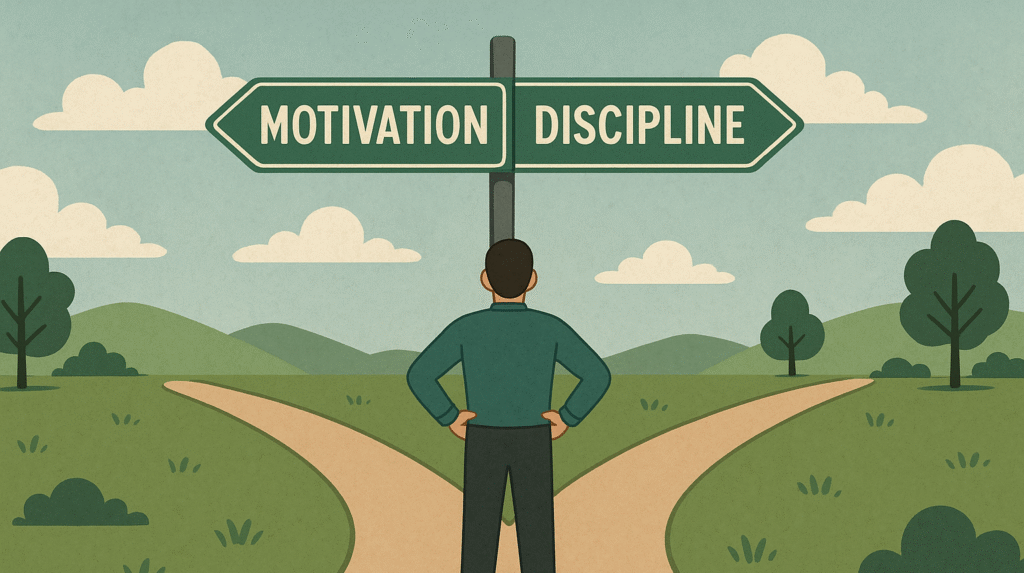Introduction: Why This Debate Matters
In the journey of personal growth and success, two forces often come into play: discipline and motivation. While motivation provides the initial spark to start a new habit or goal, discipline is the consistent force that keeps you moving forward, even when the initial excitement fades. Understanding the dynamics of discipline vs motivation is crucial for anyone aiming to achieve long-term success.
Table of Contents
What Is Motivation?

Motivation is the emotional drive that compels us to take action. It can stem from various sources, such as a desire for personal achievement, external rewards, or the influence of inspiring individuals. Motivation is often the catalyst that initiates change, pushing us to set goals and envision a better version of ourselves.
However, motivation is inherently fleeting. It can wane due to obstacles, fatigue, or changing circumstances. Relying solely on motivation can lead to inconsistency, as it’s influenced by factors beyond our control.
What Is Discipline?
Discipline is the ability to stay focused and committed to a task or goal, regardless of external circumstances or internal emotions. It’s about making deliberate choices that align with long-term objectives, even when it’s challenging or inconvenient.
Unlike motivation, discipline is a skill that can be developed and strengthened over time. It involves creating routines, setting boundaries, and cultivating habits that support consistent progress.
Discipline vs Motivation: Key Differences

| Aspect | Motivation | Discipline |
|---|---|---|
| Nature | Emotional and spontaneous | Deliberate and consistent |
| Duration | Short-term | Long-term |
| Dependency | External factors | Internal commitment |
| Reliability | Unpredictable | Dependable |
| Outcome | Initiates action | Sustains progress |
Understanding these differences highlights why discipline is often more reliable for achieving sustained success.
Why Discipline Wins in the Long Run
While motivation can kickstart your journey, discipline ensures you reach the destination. Here’s why discipline is indispensable:
- Consistency: Discipline fosters regular habits, leading to steady progress.
- Resilience: It equips you to persevere through challenges and setbacks.
- Focus: Discipline helps maintain attention on long-term goals, minimizing distractions.
- Self-Control: It strengthens your ability to resist short-term temptations in favor of long-term benefits.
As highlighted in various studies, individuals who cultivate discipline tend to achieve higher levels of success and personal fulfillment.
Real-Life Examples: Discipline in Action
- Dwayne “The Rock” Johnson: Known for his rigorous workout routines and work ethic, Johnson attributes his success to consistent discipline, often training early in the morning regardless of his schedule. Dwayne Johnson’s disciplined lifestyle.
- J.K. Rowling: Before achieving fame with the Harry Potter series, Rowling faced numerous rejections but remained disciplined in her writing, eventually leading to her breakthrough.
- Students Preparing for Exams: Those who establish and adhere to study schedules, regardless of daily motivation levels, often outperform peers who rely on last-minute cramming.
These examples underscore the power of discipline in turning aspirations into achievements.
How to Build Discipline When Motivation Fades

- Set Clear Goals: Define specific, achievable objectives to provide direction.
- Create a Routine: Establish daily habits that align with your goals.
- Monitor Progress: Keep track of your achievements to stay motivated.
- Eliminate Distractions: Identify and minimize factors that hinder focus.
- Practice Self-Compassion: Acknowledge setbacks without judgment and recommit to your goals.
By implementing these strategies, you can strengthen your discipline and maintain momentum, even when motivation wanes. daily routines of disciplined people.
Combining Both: Can You Use Motivation to Strengthen Discipline?
Absolutely. While discipline is crucial for sustained effort, motivation can be harnessed to reinforce it. For instance, celebrating small victories can boost morale, making it easier to stick to disciplined routines. Additionally, visualizing the benefits of achieving your goals can reignite motivation, complementing your disciplined efforts.
Conclusion: Choose Consistency Over Excitement

In the debate of discipline vs motivation, it’s clear that while motivation can initiate action, discipline is what drives long-term success. By cultivating discipline, you equip yourself with the tools to persevere, adapt, and ultimately achieve your goals. Remember, it’s not about waiting for inspiration; it’s about creating a consistent path forward, one deliberate step at a time.
reset your life with a 21-day discipline challenge by Click Here.
✅ Frequently Asked Questions (FAQs)
Q1. What is the main difference between discipline and motivation?
A: Motivation is the initial emotional drive to take action, while discipline is the consistent behavior that keeps you going when motivation fades.
Q2. Can motivation be developed like discipline?
A: Motivation often comes and goes, but discipline can be trained and strengthened with habits, routines, and long-term focus.
Q3. Why is discipline more important than motivation for success?
A: Discipline leads to consistency, and consistency leads to results. Motivation may start a journey, but discipline completes it.
Q4. How do I stay disciplined when I feel lazy or unmotivated?
A: Create a structured routine, reduce distractions, and focus on small daily wins that align with your larger goals.
Q5. Can I use motivation to boost discipline?
A: Yes! You can use moments of motivation to establish systems and routines that make discipline easier to maintain over time.








Leave a Comment